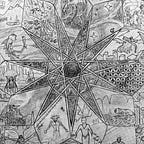Illuminatus Fiction, defining a Genre
Yup, Illuminatus Fiction.
I’m generally not too interested in what category a thing belongs to, or what genre a work of art “is”. But the coining of this new term will be useful to those who seek out “more like this”. Often I’ve met RAW fans who never heard of the Invisibles. I myself never knew about Foucault’s Pendulum until I shared an earlier version of this article and had multiple people suggest it to me.
Notable works include:
All of RAW’s fiction, Illuminatus! Shrodringers Cat, Masks of, and the HIC triology.
Grant Morrison’s Invisibles and the Filth comics.
All of Shea’s fiction.
Illuminatus Fiction is a subgenre of speculative fiction. Now I want to finish that last sentence and say: subgenre of speculative fiction focusing on secret societies and the evolution of consciousness…
But then I’m going to trail off and think for a bit. There’s a lot more to it than that.
Are Dan Brown’s works, such as the da Vinci Code, Illuminatus Fiction?
I’d say yes, it is, but in the same way that Kansas or Styx was progressive rock, or the same way that the Offspring and Green Day were punk rock. Same way Motley Crue was heavy metal. Commercial, mainstream examples of their respective genres.
Robert Shea’s books for example are basically supernatural adventure/love stories. They become Illuminatus fiction because of Shea’s co-writing Illuminatus! and because each one of his solo novels has an illuminati secret chiefs element in there and it’s hard for me to read his books without considering that the wise masters who the Zinja fighting monk meets on the astral plane in Shike, and the animal spirits and ancestral spirits encountered in the wakan by the protagonist in Shaman–without considering that they are the good guy illuminati. Shea certainly hints at the connection, within a few of his books.
But I’m also thinking that Graham Hancocks’ fictional works belong in this genre as well.
I say this because I do not see Illumiatus Fiction as being defined merely as “fiction that involves the Illuminati”, although that is part of it, but the subgenre is named after the Book Illuminatus! The subject matter and tone set by that book should be seen as defining for the genre. The subject matter including secret societies, the occult, conspiracy theories, Atlantis, discordianism/absurdity, psychedelics and consciousness expansion.
Works of Illuminatus Fiction often fit comfortable into the genres of Visionary Fiction, (more typical examples of visionary fiction include Celestine Prophecy and the Alchemist) and/or Weird Fiction, (exemplified by writers like HP Lovecraft and Arthur Machen.)
But is Illuminatus! it’s own genre?
Well, I’m not the only one to think so.
The Invisibles can be grouped alongside other texts of an emerging genre of fiction characterized by its depictions of consciousness at a future stage of human evolution as envisioned through the author’s psychedelic experiences
But not everyone agrees. Some have suggested that the Illuminatus! trilogy is an example of weird fiction. And they have a good point. The Illuminatus! featured a Great Old One. HPL himself has a cameo appearance. And the element of Cosmic Horror, of awe at encountering a reality greater then our own is basically what defines Weird Fiction–and that element is present in Illuminatus Fiction as well.
But then, read the above quote. “Consciousness at future stage of human evolution.” Okay, that sounds more like Visionary Fiction.
Then read the Wikipedia page for weird fiction. Okay, reading Wikipedia, the definition of weird fiction and the authors listed, sure looks a whole lot like horror, and nothing at all like Visionary Fiction.
And I believe this is one way to recognize Illuminatus FIction–it can often fit comfortably into both the Weird, and the Visionary. Of course we could also call many (most?) Illuminatus Fiction works Conspiracy Fiction/Paranoid Thriller.
This is the first time I’ve ever written of, or spoken of this matter, but I’ve felt this way for years. I’ve seen my own fictional works and mythos as being within the traditional of Illuminatus! and the Invisibles. There must be many great works of Illuminatus Fiction that I’ve never even heard of. It seems like many works of visionary fiction that are heavier and more substantial may count, like non-new-agey Visionary Fiction.
authors in the Illuminatus FIction Genre:
This first list can be considered Canon. Pretty much everyone who I’ve spoken with agrees about these writers belonging on the list.
- Robert Anton Wilson
- Robert Shea
- Grant Morrison
- Wachowski brothers/sisters
- Graham Hancock
- Dan Brown
- Umberto Eco
Philip k Dick. A lot of his work may seem just like straight sci-fi and some may consider his work more of a precursor to Illuminatus Fiction, but I’d say that some of his works, such as a Scanner Darkly, Vallis and Radio Free Albemuth, sit firmly within the genre.
The matrix movies too. I always saw the tradition like this: Phil K Dick–>RAW and Shea →the Invisibles and the Filth comics →the Matrix movies. Obviously there has to be much more than just that, but these seem like the biggest, most influential examples.
I’m going to consider this matter, do some research and probably come back and re-write and expand this post in a month or so.
And I’d appreciate help–so let me know if you have any suggestions for the definition, any reading recommendations or any great authors that I’ve never heard of.
Thanks
Whereas the above list is small, there’s many other books and authors suggested to me I haven’t read just yet and as such am not certain they fit the genre. Most of these I have not read yet. Others I have read,but consider their classification debatable. As I read more, and continue to establish consensus, names will move from the bottom list to the top:
- William S Burroughs the Red Night trilogy. Lots of sodomy and heroin in this one. still, it is enjoyable. The book, I mean…
